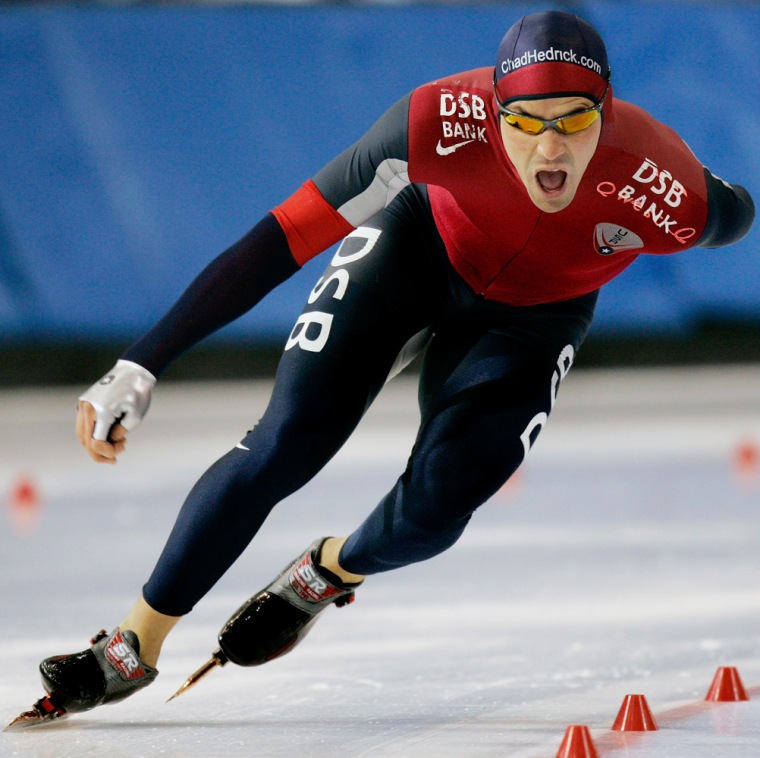If you're like many Americans, you'll probably spend a lot of time on the couch this month watching other people sweat it out on television.
It started on Sunday with the Super Bowl, one of the biggest couch-potato days of the year (no, raising a beer bottle and punching the sofa pillows do not count as exercise), and will continue through two weeks of the Olympic Games kicking off this weekend in Turin, Italy.
We're a sports-crazed nation, but one that clearly prefers to spectate rather than participate. Most Americans are overweight and out of shape, with no sign of a turnaround in sight.
But fitness experts say that if you watch closely, there are some lessons to be learned from all that time in front of the tube — ones that might enlighten, inspire or motivate even the most diehard couch potatoes:
1. First off, a reality check: There's no magic bullet for fitness.
Top athletes may be biologically gifted, but they don't get where they are by relying on their genes alone. Athletes train hard and regularly, as the many personal stories of the Olympians will surely show.
"People sometimes think that fitness just happens," says Jan Griscom, a personal trainer at Chelsea Piers, a sports and fitness complex in New York City. "They don't realize the work that goes into it."
There's no magic bullet for getting in shape. "Everyone wants to know the secret of exercise and diet, and the only secret there is, in my opinion, is consistency," says Hank Drought, a personal trainer in Madison, Conn., and a spokesperson for the National Strength and Conditioning Association.
2. But you don't have to work that hard.
Yes, athletes train intensely and they have the coaches and well-equipped facilities to help them do so. But you don't need to work out several hours a day in a fancy gym to be healthy and fit.
To keep your heart healthy, experts recommend aiming for half an hour of physical activity on most days of the week. That could mean 30 minutes jogging on a track, exercising on an elliptical trainer, playing basketball, walking around the neighborhood, swimming or pushing the lawnmower. And the half hour doesn't have to be all at once; it could be divided up into three 10-minute bouts of activity.
You may need to work harder if you want to get buff for swimsuit season, but just half an hour a day can go a long way toward keeping you healthy.
"You don't have to kill yourself with exercise," says Drought. "You don't have to be an Olympic athlete to lose 10 pounds. It doesn't have to be that painful."
3. It helps to focus on a goal.
Athletes keep their eye on the prize, whether it's qualifying for the Olympics or winning the gold. This helps them stay focused and motivated.
Setting goals can help you, too, just make sure you set realistic, achievable goals so that you don't become overwhelmed. Many exercisers make the mistake of setting their short-term goals too high, which sets them up for failure, says Drought.
And keep in mind that even athletes who get a lot of fame and fortune from physical activity still have days when they don't feel much like moving or don't want to commit time to it, says Todd Durkin, a personal trainer who works with athletes of all levels at his San Diego-based facility called Fitness Quest 10.
"Athletes have these same challenges," says Durkin, who is also a spokesperson for the American Council on Exercise.
If you're having trouble staying committed to a fitness regimen, consider hiring a trainer to keep you accountable, Durkin says. Even working with a trainer for just a few sessions can help get your fitness plan on the right track, he says.
4. Patience and perseverance pay off.
Athletes don't reach the peak of their game overnight. Many spend their lives training for the Olympics.
While it doesn't have to take years to get fit, the pounds don't come off and the six-pack abs don't appear overnight. Experts generally recommend losing no more than 1 to 2 pounds a week — for slow and steady results.
In fact, it would be a huge mistake to watch the Olympics and then — full of inspiration and motivation — run out and try to compete like the champions. That could hurt, big-time, notes Phong Tran, a personal trainer at The Sports Club/LA in Los Angeles.
Instead, start slowly, even if it's just to walk around the block once or twice. When that feels comfortable, add a couple more blocks and so on. Easing into exercise will help you avoid injuries, keep you from getting overwhelmed and allow you to start actually enjoying the activity. "People feel good and then they start to do more," Tran says.
5. Everyone suffers setbacks.
Even elite athletes lose, get injured and doubt themselves. They're human.
Keep that in mind if you fall off the fitness wagon. It's never too late to get back on, and all exercise adds up.
6. You can do it.
Maybe you'll never see Olympic gold, or even care to, but if there's one thing you can gain from watching the games it's inspiration.
The Olympics are full of stories of people overcoming tremendous odds to get on that world stage. And those stories can be highly motivational, notes Drought. If you're inspired by the achievements of these athletes, he says, just maybe you'll tell yourself, "You know what, I can do this."
Act on the inspiration, says Griscom, and get moving: "Find the athlete inside of you."
Smart Fitness appears every other Tuesday.
